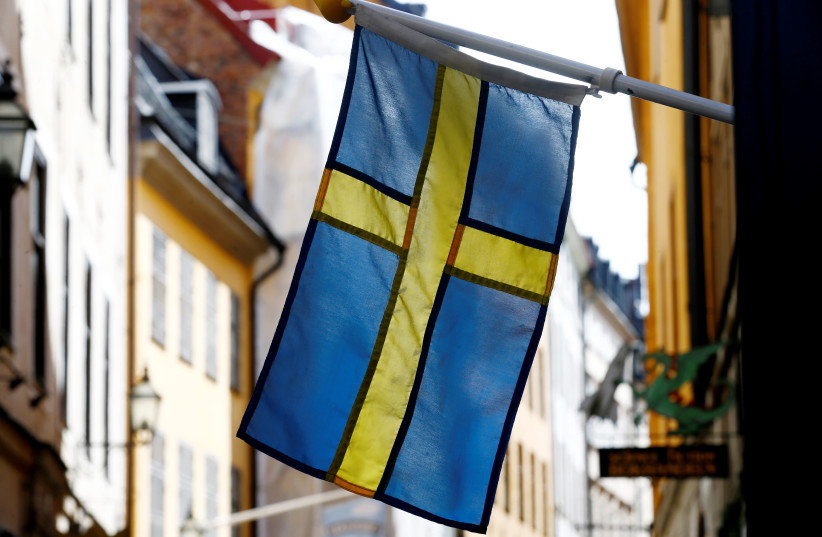Swedish Prime Minister Stefan Löfven called for “concrete measures” to combat antisemitism and advance Holocaust remembrance, at the Malmö International Forum on Holocaust Remembrance and Combating Antisemitism.
Löfven noted that antisemitism is present in all parts of society, and that it had been boosted in Europe by the arrival of immigrants from where antisemitism is rife, an implicit reference to Muslim immigrants from the Middle East.
Malmö Mayor Katrin Stjernfeldt Jammeh, whose city has been a hotbed of antisemitic incidents and attacks for years emanating in particular from its large Muslim population, also addressed the conference, while President Isaac Herzog, French President Emmanuel Macron and US Secretary of State Anthony Blinken sent video messages.
Speaking first in the plenary session of the conference, Löfven mentioned the Stockholm International Forum on the Holocaust of January 2000, which resulted in the founding of the International Holocaust Remembrance Alliance, and the 2020 IHRA Ministerial Declaration as important milestones in efforts to combat antisemitism and preserve the memory of the Holocaust.
“We are not looking for another declaration, we are looking to translate these principles of these documents into reality,” Löfven said at Wednesday’s conference. “I have therefore encouraged delegations that are representative here in Malmö today to present concrete measures to promote Holocaust remembrance and to combat antisemitism, anti-Gypsism and other forms of racism.”

The Swedish prime minister acknowledged that antisemitism is present today in “extreme right-wing groups, parts of the Left, in Islamist environments, and among ordinary citizens.”
He specifically observed that antisemitism is present “among adults and children who fled to Europe from countries where hatred of Jews is promoted in schools and through state-propaganda,” an oblique reference to Muslim immigrants to Europe among whom antisemitism is a severe problem.
Löfven also acknowledged Malmö’s problems with antisemitism, but insisted that the city and its mayor were working hard to combat the phenomenon, and that Stjernfeldt Jammehhad specifically asked that the conference be held in her city.
Herzog lamented the inherent “demonization and antisemitism” in attacks on Israel’s right to exist, and expressed concern about rising antisemitic incidents in Europe and the world more broadly.
“We have witnessed thousands of antisemitic assaults, vandalism and threats from extremists all over, including in Malmö,” he said. “This rise in antisemitic attacks on the streets, the physical attacks and assaults and verbal assaults, offensive articles and increasing intimidation on the web have been fueled, in large part, by the explosion of antisemitic incitement online.”
COMBATING ANTISEMITISM today requires “working aggressively on social media, including with, and confronting, social media companies to ensure that hateful incitement is quickly removed,” the president said, adding that legislation, litigation, adjudication and law enforcement were necessary tools in the struggle against Jew-hatred.
Aron Verstandig, chairman of the Stockholm Jewish Community and the Official Council of Swedish Communities, welcomed the staging of the conference, but said that the situation for Jews in Sweden was still problematic, including the security situation, particularly in Malmö.
He added that there has been a growing acknowledgment in recent years that antisemitism is not just confined to the far-right and neo-Nazi groups, as was formerly believed, but present as well on the far Left and in the Muslim community.
Verstandig also said the Jewish community now has good ties and cooperation with the Malmö Municipal Council and the mayor, which are being used to help educate the city’s broader population about Jewish life.
Rabbi Moshe David Hacohen, who has served as rabbi of the Malmö Jewish community for nearly five years, expressed disappointment that the conference had not dealt in greater depth specifically with the situation in Malmö, and had not invited more representatives of the Jewish community to discuss the issue.
Hacohen himself was not invited to the conference, but did meet privately with the prime minister.
“It was very good to have the conference in Malmö, but there was a missed opportunity because you could have brought the situation in Malmö as an example,” said the rabbi.
Hacohen – who together with local Muslim leader Imam Salahuddin Barakat established Amanah: The Jewish-Muslim Faith and Trust Project in 2017 – said the conference should have had a greater focus on fostering Jewish life in Sweden and not just the Holocaust and antisemitism.
He noted that religious identity is not part of the public discourse, and that cultural norms are to keep religion private.
“If a young teen thinks they can’t be proudly Jewish, then it’s a problem,” said Hacohen.
The rabbi said the situation for the Jew community in Malmö, of which there are 530 formal members, and another approximately 1,000 Jews in the surrounding areas, was “challenging,” particularly regarding “tensions over the Middle East situation.”
At the same time, he said that change was happening, with Muslim leaders having condemned antisemitic rhetoric and actions.
He added that cooperation between the Jewish and Muslim communities, in which he has played a central part, has helped create new bonds between the two groups.
